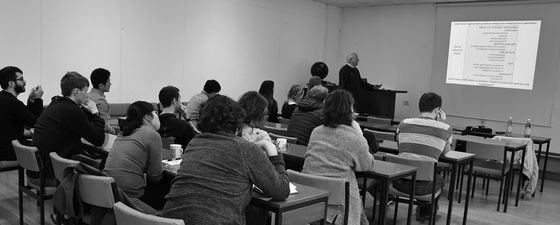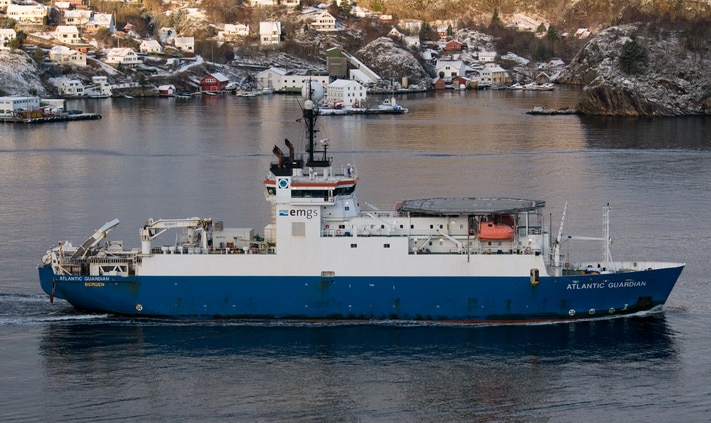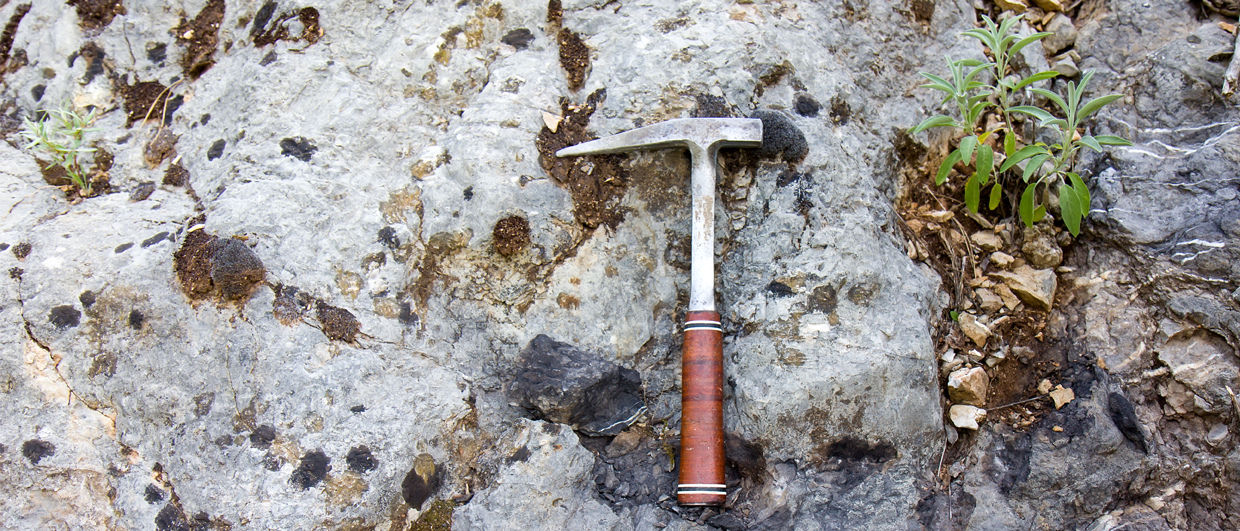A virtual internship for students and early career professionals in the exploration of oil and gas resources, where everybody contributes and everybody learns.
Allen Bertagne guiding the team from Perugia University. © SEG.
The E&P industry is facing major changes due to the departure of many experienced professionals, resulting in limited or non-existent access to mentors for new hires and early career staff transitioning from the academic to the business world. Universities rightly focus on theoretical foundations and principles, but have limited time to teach the practical exploration technical and business workflows used by oil companies.
The Society of Exploration Geophysicists (SEG) is addressing this challenge with the multidisciplinary EVOLVE student program to ‘Develop the Fearless Explorers of the Future’. This program has the important attributes shown below.
E &P
V alue Creation: align with company’s strategies and goals;
O nline Collaboration: team members, teams, mentors, and EVOLVE leaders;
L eading Edge Technologies: 3D datasets and key wells;
V irtual Internships: use of the cloud and video technology;
E xtensive Mentoring: key strength of EVOLVE.
EVOLVE’s ultimate objective is to prepare students for jobs in the energy industry. Each ‘Fearless Explorer’ team of four to six students with backgrounds in geology, geophysics, petrophysics and reservoir engineering work together reviewing a technical dataset to recommend the best investment opportunity in their assigned area. EVOLVE is non-competitive and as a result everybody contributes and everybody learns. The program is coordinated technically by Allen Bertagne, from the SEG EVOLVE office in Houston, reporting to Tom Agnew, SEG Associate Director, Programs. Technical support is provided by Jesus Nevarez, a University of Houston graduate, advisors Mike Forrest and Jennifer Thompson, as well as many other experienced mentors.
“EVOLVE has been a fantastic program that helped me to realize how beautiful and engaging, all this hunt for oil can be. I put this program in my resume, and this summer, I had one of the most delightful surprises ever. I have landed an excellent internship, and I am working with a great international team on an offshore development project. This EVOLVE program is well known right now, and professional from industry are taking it for serious consideration as proper training for young professionals.” Alexandru Badescu | Petroleum Engineering Student, Montanuniversität Leoben
SEG EVOLVE started in 2015 with a pilot program. Halliburton is the founding sponsor and continues to strongly support the program, including providing access to the Halliburton Landmark DecisionSpace Platform, delivered via the Cloud. Ten university teams from US, Canada, Europe and Latin America participated in 2018 and the program was expanded to 20 international teams this year, with the activities being undertaken from mid-January to the end of May to conform to college semesters.
Collaborating in Teams to Maximize Learning: E&P Technical Workflow
Teamwork at the SEG University of Bucharest Chapter. © SEG.
In early January, EVOLVE teams are assigned one of several public domain datasets, currently from the Gulf of Mexico, Dutch North Sea and New Zealand. Software is provided either via the Halliburton Cloud, including the Decision Space software, or local installation of Schlumberger’s Petrel or IHS Markit’s Kingdom. Key tutorials are provided by IHRDC and delivered via Landmark’s iEnergy platform, and Rose & Associates teaches a half-day risk analysis course.
Following an individual Project Kickoff meeting in January, each team conducts a literature review and gathers data, with the goal of understanding the petroleum geology of their assigned area in order to prepare a detailed plan to allow them to identify the best investment opportunity within the area. This is followed by the mid-project presentation in March to review seismic regional and prospect mapping, integrate regional geology studies and well data into their interpretation, and to propose a detailed work plan for the second phase. The final presentations are made in May to an ‘Executive Committee’ focusing on the recommended best investment opportunity, supported by key technical and economic data.
Mike Forrest at the Cambridge Student Chapter Team. © Patsy Alexander.
The program has no prepared answers: the emphasis for students is not the ‘right answer’ but on using available data to think carefully and ask the right questions. Students are encouraged to gather and integrate any and all data they can find for their project area.
Collaboration is important. The E&P work force has changed from experts working in silos to geologists, geophysicists and reservoir engineers working together as subsurface teams to share knowledge and learning across technical and business boundaries, considering the entire E&P life cycle to ensure optimal execution. EVOLVE training is an introduction to collaborating in teams to maximize learning.
The Technical Coordinator continues working with the teams over the summer in preparation for two half-day sessions at the SEG Annual Meeting where participants present their investment opportunity and also discuss their learnings from the year. Each team makes a 15-minute prospect presentation to an international audience during the oral sessions and hosts a poster session to discuss their detailed work and conclusions with other professionals. They also participate in a student panel discussion to answer questions from the audience and give industry leaders recommendations for the future.
The Value of Mentors
Mentors exchanging ideas on student prospects during the final project presentation. © SEG.
Mentors play a key role in EVOLVE in every phase of the program. The Technical Coordinator holds bi-weekly virtual sessions with every team in a global team meeting, where progress is reviewed and suggestions made. Students often make impromptu informal presentations at that time, exchange ideas among themselves, and share sources of useful data.
“Students gain exposure to real world data, top class Mentors, industry leading software and critique and direction that no other industry/academia program can provide. This phenomenal learning experience is unmatched in any earth sciences industry program.” Dean Mento, P.G. | Senior Petroleum Geophysicist, IHRDC
Students are free to ask the mentors and other teams questions on most topics via the SEG Basecamp website, except anything related to their specific prospect. Mentors send the teams technical papers about geology/geophysical technical issues and case histories and make personal visits to some universities for discussions with the teams and their faculty advisors. Finally, up to 15 mentors attend the mid-project and final team presentations either in person at the EVOLVE Houston office or via video communication.
Mike Forrest with members of the team from Cambridge University. © Patsy Alexander.
Many of the EVOLVE mentors are proficient in the use of the software being used and so are able to give specific workflow suggestions, or on certain occasions even “grab the mouse, and drive.” Mentors do not ‘know the answers’ in advance, so observing how they think and develop their own approach is invaluable to the students.
EVOLVE is more than just technical activities and learning. It also strives to develop the human traits required to be a successful explorer, while having fun along the way. Personal meetings allow for customized exchanges and allow the mentors to gain an understanding of student competencies and remaining gaps.
“SEG EVOLVE program has broken all stereotypes of what well-rounded explorations training should look like. The program brings value to both students and employers alike. Simply put, EVOLVE is yet another reason to be involved with SEG.” Olga Nedorub, Geophysicist at Apache Corporation
This real-world experience includes learning the basic technology beyond a student’s primary college major, building teamwork and dividing job tasks, and making timelines to accomplish team goals in the assigned timeframe. Collaborative learning with real technical data provides a lasting impression and learning experience for the students. Perhaps most importantly, lifelong bonds are formed.
EVOLVE Long-Term Vision
‘Ask the Students’: a panel discussion where teams field questions from an audience of professionals. © SEG.
SEG plans for 20 university teams to participate in 2020. Application information will be available in early October, 2019 and teams will be selected in early November. The focus is on geology, geophysics, rock physics and engineering masters students, but PhD students and 3rd and 4th year undergraduate students can apply. Active participation of the university faculty advisor is essential. Universities and students interested in participating should visit the SEG website.
SEG intends increasing EVOLVE to 40 multidisciplinary university teams from around the world during the next two to three years, and is also encouraging universities to award course credits to participants. It wants to add additional comprehensive datasets from several areas worldwide and increase technology application learning from enhanced datasets.
The organization is also keen to train oil and service company young professionals through this scheme by introducing an Early Career Professional (ECP) EVOLVE in 2020, aimed at employees with less than ten years’ experience. This program will use the datasets and training processes described above, over a six-month period, with participants spending about 25% of their worktime on the project.
The SEG and SEG Foundation are seeking additional industry partners and sponsors, including individuals, to financially support EVOLVE, guide it, and ensure the program continues to succeed (details available on SEG website).
The training and practical experience that EVOLVE offers both students and young professionals will be essential if the industry is to meet the major energy challenges that lie ahead. These future professionals will be well prepared for a successful career involving complex subsurface, economic and human elements and, over time, they will indeed become the fearless explorers of the future!
“I am honored to share my thoughts and experience on EVOLVE with GeoExpro magazine. I would certainly highlight a few comments especially the collaborative values of EVOLVE rather than competitiveness of other student programs like AAPG’s IBA and EAGE’s Laurie Drake, which is for me personally has a big difference in learning closely with industry experts and prepare the students of what expected from them in the industry. Other than that, my experience and participation in EVOLVE has help me to be more stand out than other candidates when applying for jobs. I remember that the recruiters asked me about EVOLVE and certainly that got their attention.” Muhamad Muizzudin Bin Mohd Jamaludin | Geoscientist / MSc Applied Geophysics / Petroleum Geoscience Graduate, Malaysia
Further Reading on Education in the Geosciences
Some recommended GEO ExPro articles relating to, or similar in content to, education in the present and future of geosciences in oil and gas.
EAGE 2019 London: Embracing Change – Creativity for the Future of Oil, Gas and Energy
Jane Whaley
The EAGE 2019 concentrated on embracing change for the future of exploration and production of oil, gas and energy resources, with a particular focus on innovative technologies and methodologies in the hunt for energy and to address climate change. This conference round-up is brought to you in association with Indalo International Ltd.
This article appeared in July, 2019
Creating Excitement in the Geosciences
Thomas Smith
At G-Camp teachers learn about geology through a very diverse and eye-opening field experience, returning to their classrooms eager to share their new-found knowledge and create excitement in the geosciences to inspire their students.
This article appeared in Vol. 16, No. 1 – 2019
Communicating Geoscience
Tim Daley
Geological Society Petroleum Group event in London entitled Communicating Geoscience: Building Public Interest and Promoting Inclusive Dialogue.
This article appeared in Vol. 15, No. 5 – 2018
Educating with Purpose
Thomas Smith
After using cutting edge geologic concepts to find a major oil field in southwest Wyoming, Dr. Robert Weimer has spent the last 51 years at Colorado School of Mines educating others in the use of applied science.
This article appeared in Vol. 5, No. 6 – 2008





